
Last week, the U.S. Supreme Court heard arguments in what has been called the most significant abortion case in a generation. Led by Whole Woman’s Health, abortion providers in Texas have challenged a state law that requires their clinics and providers to meet standards that have nothing to do with their ability to provide safe, effective abortion care—and everything to do with closing down clinics and limiting women’s access to critical services. And the problem isn’t limited to Texas: Similar restrictions have been passed in other states, with the greatest impact on women in rural areas, immigrant women, poor women, young women, and women of color.
With the Court in session, thousands rallied outside in support of women’s right to make decisions about their own health and wellbeing, with access to quality, affordable, respectful services. It was exciting to see a multi-generational and diverse crowd—including the Harry Potter Fan Club for Abortion Access, immigrant Latinas from McAllen, Texas, African American women from Georgia, trans women, Asian American women from New York, Hollywood actors, and the doctors and medical personnel who provide compassionate care—with many of the organizations Ford supports taking the lead: submitting historic amicus (friend of the court) briefs, presenting oral arguments before the Court, and rallying on the steps outside. A group of us from Ford’s Gender, Racial, and Ethnic Justice team traveled to Washington, DC for the day to stand among them. While rallies and protests are familiar to me, this was a newer experience for my colleagues. I was curious to hear what it was like for them.
Lourdes Rivera Senior Program Officer, Gender, Racial, and Ethic Justice
A picture of solidarity and camaraderie
It was a cold, blustery early morning on the steps of the Supreme Court, but there was excitement in the air. The crowd was full of cheerful, well-informed young women and men holding placards and distributing snacks and water to the crowd—an amazing picture of solidarity and camaraderie.
But the jovial atmosphere did not take away from the reason why these strong women and some men were there, speaking up: to make sure that laws do not take away women’s rights, including the right to control her own body.
Renee Villanueva Department Coordinator, Gender, Racial, and Ethic Justice
This is what a movement looks like
This was my first experience attending a rally. Working in philanthropy, we always hear about “movements”—but it was exciting to see firsthand the amount of people who are moved to stand in the cold and support a cause. People opposed to abortion were not relegated to a separate area; instead, people on different sides of the issue were mixed together. But supporters of reproductive justice and freedom far outnumbered the opposition.
The signs I saw and speeches I heard highlighted how personal this debate is to all kinds of women, from all over the country. The stakes are high. This historic Supreme Court decision will dictate a woman’s ability to make the biggest decision of her life: when, how, and whether to become a mother.
Maria Guzman Program Assistant, Gender, Racial, and Ethic Justice
Coming together to support women’s agency
The air outside the Supreme Court was filled with cries of “Abortion is medical, not political” and “Stop the Sham.” Although the court case is focused on Texas, it’s implications extend far beyond one state—so it was fitting that people came to Washington, DC from across the country to support women’s access to abortion.
But it wasn’t the distance they traveled to stand in front of the Court that amazed me. It was the diversity of the crowd in terms of gender, sexual orientation, race, and religion. By coming together on a cold Wednesday morning to rally in support of a woman’s agency—and her ability to both spatially and financially access her right to an abortion—these groups showed that fundamental human rights transcend any one category of people.
Whether we’re fighting for the fundamental human rights of people in the U.S. or abroad, when we come together despite our differences and stand with those who face barriers to access and justice, all our voices are strengthened.
LaToya Niles Program Assistant, Gender, Racial, and Ethic Justice
Speaking out, speaking up
Though abortion has been legal in the United States for more than 40 years, it is still surrounded by stigma. Considering how many women are shamed and attacked for having an abortion, it’s not surprising that they are reluctant to discuss their experience publicly. But on the steps of the Supreme Court, dozens of people shared their personal stories. “I am an unapologetic woman who has had an abortion,” said one of them, Sonya Renee Taylor, who had an abortion as a 20-year-old college sophomore.
Every day, abortion providers risk their lives working to ensure that women have access to safe, affordable, and compassionate abortion care. It was inspiring to hear these brave women and men speak up and defend women’s right to make decisions about their own bodies. We still have a long way to go until all women in this country can fully realize their sexual and reproductive rights, but after witnessing the dedication and passion of these fierce advocates, I believe anything is possible.
Minna Penttila Program Assistant, Gender, Racial, and Ethic Justice